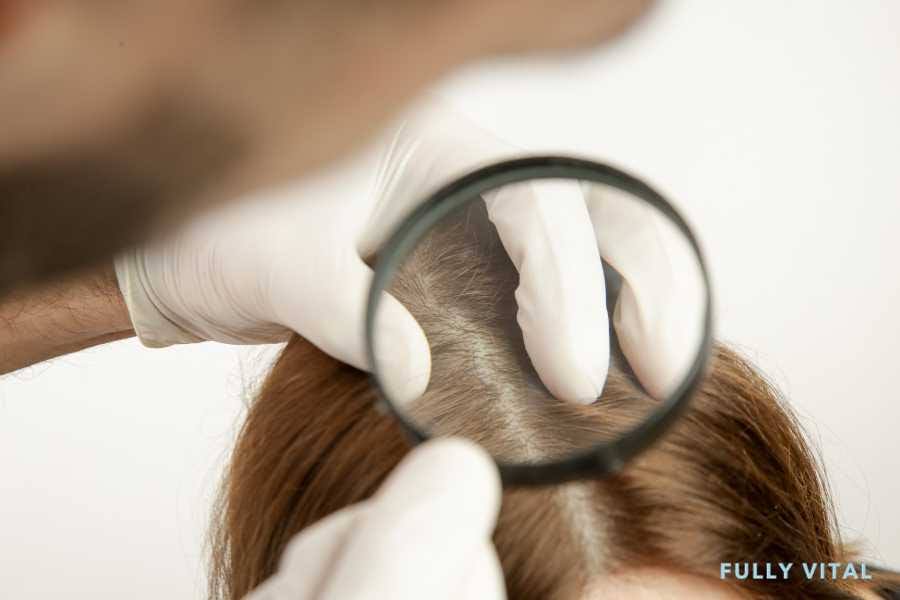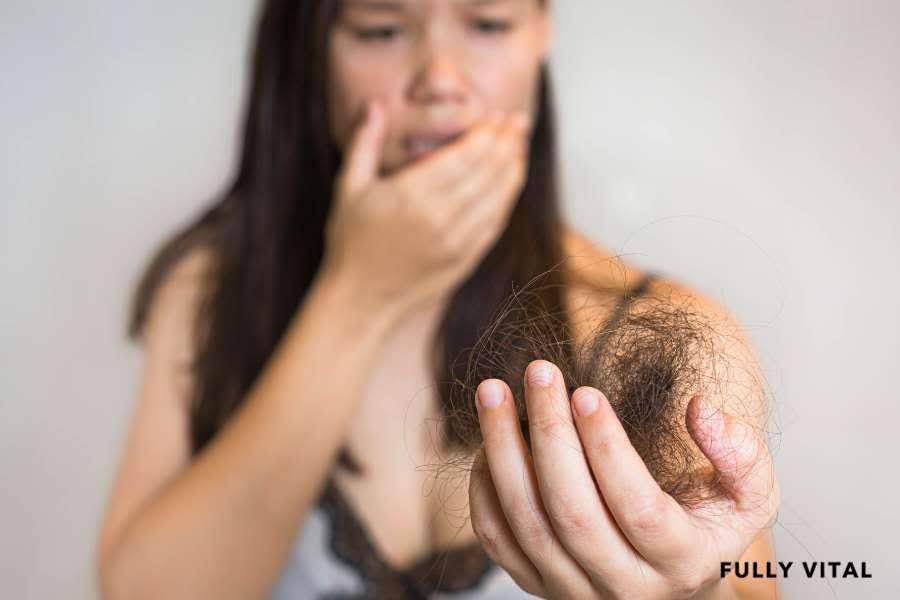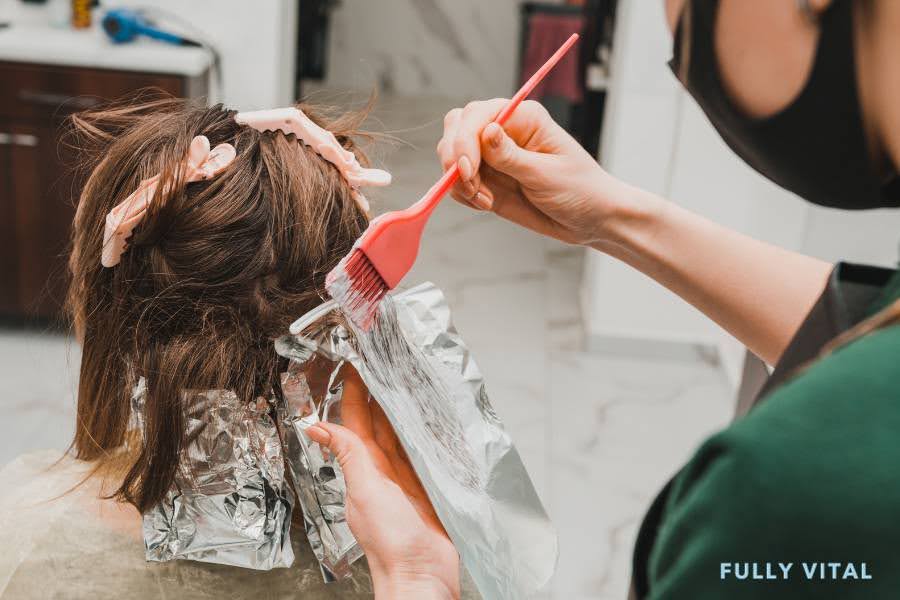
Effective Strategies To Manage Scalp Dermatitis: Expert Tips & Remedies
Hey there! If you're struggling with scalp dermatitis, I know how tough that can be.
It's not just the itchy, flaky scalp that bothers you; it's also the worry about your hair's health and appearance.
As someone who's always looking for ways to help others maintain gorgeous and healthy hair, I understand the importance of feeling confident about your mane.
After all, at Fully Vital, we believe every strand of hair on your head is precious.
Scalp dermatitis is a condition that can affect anyone, regardless of hair type, and can be especially frustrating if you're trying to stimulate hair growth.
This pesky issue can cause your scalp to become red, itchy, and flaky, and it often needs more than just regular shampoo to get under control.
Well, that's exactly why I'm here! I'm going to share some simple, yet effective strategies that can help manage scalp dermatitis and keep your hair looking its best.
Enhance your hair with fully vital hair growth products today!

I LOVE MY HAIR NOW
FullyVital hair serum and hair vitamins made tremendous improvements in my hair. I truly love my hair now.
Dorit S.,
Understanding Scalp Dermatitis: A Comprehensive Overview
Scalp dermatitis is an uncomfortable condition causing redness, itching, and flakes on your scalp.
It can be triggered by various factors, including sensitivity to hair products, stress, weather changes, or diet.
At Fully Vital, we're here to help you manage scalp health for vibrant hair growth.
Just like healthy soil is essential for a thriving garden, a healthy scalp is crucial for beautiful hair.
Join us on the journey to a happier scalp and healthier hair!1
The Causes Of Scalp Dermatitis: What You Need To Know
So, you might be wondering, "What's the deal with my scalp?
Why is it acting up?" It's important to understand the causes of scalp dermatitis to get to the root of the problem.
Knowing what triggers your symptoms can help you take the right steps to manage them effectively.
Irritants
This includes hair products with harsh chemicals and certain ingredients that might not agree with your skin.
You put something on your head, and bam, your scalp becomes an itchy mess.
Shampoos, conditioners, hair dyes, and even some styling products can be the culprits here.
Yeast Overgrowth
Like I mentioned earlier, we all have yeast living on our scalp, but sometimes it grows too much and leads to that dandruff and inflammation we all want to avoid.
Environmental Factors
Changes in the weather, particularly cold and dry air, can make your scalp dry and flaky.
And if you're a stress magnet (like many of us!), know that stress isn't just bad for your mind; it can take a toll on your skin, including your scalp.
Genetics
Can also be behind scalp dermatitis.
If your family has a history of skin conditions, like eczema or psoriasis, then you might be more prone to developing scalp issues.
Diet
Can influence your skin's health.
Eating lots of sugary foods, or lacking certain vitamins, can tip the scales and lead to problematic skin, including on your scalp.
Medical Conditions
Can play a role in scalp dermatitis.
People with immune system issues, hormonal imbalances or neurological conditions like Parkinson's disease may experience more issues with their scalp skin.
Early Signs And Symptoms Of Scalp Dermatitis
Spotting the early signs and symptoms of scalp dermatitis can make a big difference in how you manage it.
Catching the condition early on means you can start tackling it before it gets too comfy on your scalp.2
Let’s quickly go over what you should keep an eye out for:
Itching
It’s that nagging feeling that makes you want to scratch.
If your scalp's starting to feel itchier than usual, it's often the first sign that something's not quite right up there.
Redness
Keep an eye out for areas that look redder than usual.
This can be a little tough to spot, especially if you have a lot of hair, but it's a tell-tale sign of irritation.
Dry flakes
These might be small and white or even a bit oily looking.
If you're finding flakes on your shoulders or in your hair, pay attention, because it's a common early symptom.
Oily or scaly skin
Sometimes, dermatitis can make your scalp feel more oily.
In some cases, you might even get areas of scaly skin that feel like a little patch of rough terrain on your head.
Sensitivity
You might find that your scalp feels tender, and using certain hair products could cause a stinging or burning sensation.
Temporary hair thinning
In some cases, the irritation and constant scratching can lead to a bit of hair loss or thinning, but this is often reversible when the dermatitis is treated.

Scalp Dermatitis Vs. Dandruff: Knowing The Difference
Distinguishing between scalp dermatitis and dandruff is crucial for effective treatment.
Dandruff is characterized by flakes without severe redness or inflammation, often caused by excess scalp oil and yeast.
It's manageable with anti-dandruff shampoo.
Scalp dermatitis is more intense, involving inflammation, itching, redness, and various triggers.
Treatment for scalp dermatitis may require medicated shampoos, topical treatments, or lifestyle changes, often requiring medical consultation.3

The Role Of Diet In Managing Scalp Dermatitis
Addressing diet is crucial in managing scalp dermatitis.
Staying hydrated is essential, as water keeps the skin, including the scalp, healthy and less prone to irritation.
Including omega-3 fatty acids, found in fish, walnuts, and flaxseeds, can help reduce skin inflammation.
Antioxidants from fruits and vegetables, like berries and spinach, combat skin-damaging free radicals.
Zinc, found in pumpkin seeds and lentils, supports skin and immune health.
Probiotics in yogurt and kefir balance the scalp's microbiome, preventing yeast overgrowth linked to dandruff.
However, it's important to limit sugar, refined carbs, alcohol, and processed foods, as they can trigger inflammation and worsen dermatitis symptoms.
Unlock The Secret To Youthful, Vibrant Hair With Fully VitalAre you yearning for a way to turn back the clock on hair aging? Have you been searching for a trustworthy solution to foster a healthier relationship with your hair? Look no further—Fully Vital is here to revolutionize your hair care routine! Our meticulously crafted hair growth products offer you the promise of thicker, fuller, and more youthful hair, employing the power of science to make hair aging a worry of the past. Experience the wonders of using Fully Vital and let our results speak for themselves:
Don't let hair aging dampen your confidence. Step into a world where your hair's vitality and beauty are maintained for years to come. Say goodbye to thinning and lifeless hair, and embrace a Fully Vital life! Don't wait for change, make change—invigorate your hair care routine today and rejoice in the lasting benefits. Discover Your Best Hair — Let Fully Vital elevate your hair journey now! |
Final Thoughts On Scalp Dermatitis
Wrestling with scalp dermatitis isn't a walk in the park, but with the right strategies, you can manage it and get back to feeling great about your hair.
Remember to listen to your scalp's cues.
It'll let you know when it's not happy, and that's when you need to step in with the right care.
Aim to understand the triggers, spot the early symptoms, and adjust your diet and lifestyle accordingly.
Toss in some targeted treatments with calming, restorative ingredients, and you're on your way to a less itchy, flake-free scalp.
And let's not forget the importance of a balanced diet.
Eating right can play a big part in calming inflammation and providing your skin with the nutrients it needs.
Trust me, your scalp—and your hair—will thank you for it.
At Fully Vital, we're all about empowering you with the knowledge and resources you need for healthier hair from root to tip.
So, use these tips as part of your mission to nurture your scalp back to health.
Remember, a happy scalp leads to thriving, beautiful hair, and we're here to support you every step of the way.
Together, let's say goodbye to scalp dermatitis and hello to vibrant, fully vital hair!
Check out our recent blogs:
- Effortless Elegance: How To Style And Preserve Your Back Bun With Ease
- Hairbrush Maintenance 101: How Often Should You Replace Your Hairbrush?
- The Ultimate Guide To Prenatal Vitamins And Hair Growth: Are They Worth The Hype?
Frequently Asked Questions On Managing Scalp Dermatitis
What causes scalp dermatitis?
Scalp dermatitis can be triggered by a variety of factors, such as yeast-like fungus, dry skin, oily skin, other skin conditions, allergic reactions, and even stress.
What are the symptoms of scalp dermatitis?
Common symptoms include itching, flaking, redness on the scalp, and sometimes, greasy or crusty scales.
What are some effective strategies to manage scalp dermatitis?
Managing scalp dermatitis effectively includes keeping the scalp clean, using gentle hair care products, avoiding harsh chemicals, managing stress levels, and using over-the-counter medicated shampoos.
Does scalp dermatitis lead to hair loss?
In some cases, severe scalp dermatitis can contribute to hair thinning or loss, primarily due to scratching and inflammation affecting the hair follicles.
Can scalp dermatitis be cured?
Scalp dermatitis can often be managed with the right treatment and lifestyle adjustments, but cure can depend on the type and cause of the dermatitis.
What is the role of diet in managing scalp dermatitis?
Eating a balanced diet rich in anti-inflammatory foods and essential nutrients can help manage symptoms by improving overall skin health.
What remedies can help soothe scalp dermatitis?
Home remedies like aloe vera, tea tree oil, coconut oil, and apple cider vinegar might soothe the scalp.
But it's essential to patch test first to prevent further irritation.
How effective is topical treatment for scalp dermatitis?
Topical treatments, particularly those containing active ingredients like ketoconazole, salicylic acid, or zinc pyrithione, can be pretty effective in treating flare-ups.
Can stress trigger scalp dermatitis?
Yes, stress is known to weaken the immune system and can trigger or worsen scalp dermatitis.
What type of shampoo should I use for scalp dermatitis?
Use a gentle, sulfate-free shampoo formulated for sensitive skin.
Shampoos with tea tree oil, salicylic acid, zinc, or ketoconazole can also help manage symptoms.
Sources:
- Seborrheic Dermatitis: What Is It, Diagnosis & Treatment. (n.d.). Cleveland Clinic. https://my.clevelandclinic.org/health/diseases/14403-seborrheic-dermatitis
- Mayo Clinic. (2018). Seborrheic dermatitis - Symptoms and causes. Mayo Clinic. https://www.mayoclinic.org/diseases-conditions/seborrheic-dermatitis/symptoms-causes/syc-20352710
- Borda, L. J., & Wikramanayake, T. C. (2015). Seborrheic Dermatitis and Dandruff: A Comprehensive Review. Journal of Clinical and Investigative Dermatology, 3(2). https://www.ncbi.nlm.nih.gov/pmc/articles/PMC4852869/







